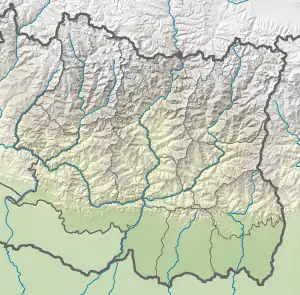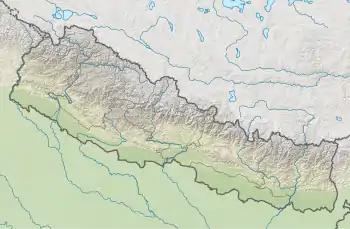Aathrai
आठराई गाउँपालिका | |
|---|---|
 Aathrai Location in Koshi Province  Aathrai Aathrai (Nepal) | |
| Coordinates: 27°13′N 87°38′E / 27.21°N 87.64°E | |
| Province | Koshi Province |
| District | Tehrathum |
| Wards | 7 |
| Established | 10 March 2017 |
| Government | |
| • Type | Rural Council |
| • Chairperson | Mr. Maan B. Limbu (CPN (US)) |
| • Vice-chairperson | Mrs. Rupa Devi Kandangwa (NCP) |
| Area | |
| • Total | 167.07 km2 (64.51 sq mi) |
| Population (2011) | |
| • Total | 21,747 |
| • Density | 130/km2 (340/sq mi) |
| Time zone | UTC+5:45 (Nepal Standard Time) |
| Headquarter | Sankranti Bazar |
| Website | official website |
Aathrai (Nepali: आठराई गाउँपालिका) is a rural municipality (gaunpalika) out of four rural municipality located in Tehrathum District of Koshi Province of Nepal. There are a total of 6 municipalities in Tehrathum in which 2 are urban and 4 are rural.
According to Ministry of Federal Affairs and Local Developme Aathrai has an area of 167.07 square kilometres (64.51 sq mi) and the total population of the municipality is 21747 as of Census of Nepal 2011.[1][2][3]
Hawaku, Iwa, Chhate Dhunga, Chuhandanda Thoklung, Sankranti Bazar and Khamlalung which previously were all separate Village development committee merged to form this new local level body. Fulfilling the requirement of the new Constitution of Nepal 2015, Ministry of Federal Affairs and Local Development replaced all old VDCs and Municipalities into 753 new local level body (Municipality).[1][3]
The rural municipality is divided into total 7 wards and the headquarter of this newly formed rural municipality is situated in Sankranti Bazar.[1][3] It is known widely for being the birthplace of former Nepalese Prime Minister KP Sharma Oli
Demographics
At the time of the 2011 Nepal census, Aathrai Rural Municipality had a population of 21,747. Of these, 48.8% spoke Nepali, 30.6% Limbu, 10.8% Tamang, 2.6% Magar, 1.9% Gurung, 1.7% Rai, 1.0% Newar, 0.8% Sherpa, 0.6% Majhi, 0.4% Yakkha, 0.2% Sanskrit, 0.1% Bantawa, 0.1% Maithili and 0.1% other languages as their first language.[4]
In terms of ethnicity/caste, 31.3% were Limbu, 20.0% Hill Brahmin, 11.1% Tamang, 10.8% Chhetri, 6.6% Kami, 3.7% Damai/Dholi, 3.3% Gurung, 2.9% Magar, 2.3% Newar, 2.0% Rai, 1.8% Sarki, 1.4% Gharti/Bhujel, 0.9% Sherpa, 0.8% Majhi, 0.4% Sanyasi/Dasnami, 0.4% Yakkha, 0.1% Khawas and 0.2% others.[5]
In terms of religion, 49.8% were Hindu, 31.0% Kirati, 17.5% Buddhist, 0.8% Christian, 0.6% Prakriti and 0.3% others.[6]
In terms of literacy, 72.7% could read and write, 2.1% could only read and 25.1% could neither read nor write.[7]
References
- 1 2 3 "स्थानीय तहहरुको विवरण". www.mofald.gov.np/en. MoFALD. Archived from the original on 31 August 2018. Retrieved 23 April 2018.
- ↑ "CITY POPULATION – statistics, maps & charts". www.citypopulation.de. 8 October 2017. Retrieved 23 April 2018.
- 1 2 3 "आठराई गाउँपलिकाको को सक्षिप्त परिचय" [Short Introduction of Aathrai Rural Municipality]. www.aathraimun.gov.np (in Nepali). Aathrai Rural Municipality. Retrieved 23 April 2018.
- ↑ NepalMap Language
- ↑ NepalMap Caste
- ↑ NepalMap Religion
- ↑ NepalMap Literacy
External links
